The Future of AI in Mobile App Development in 2024
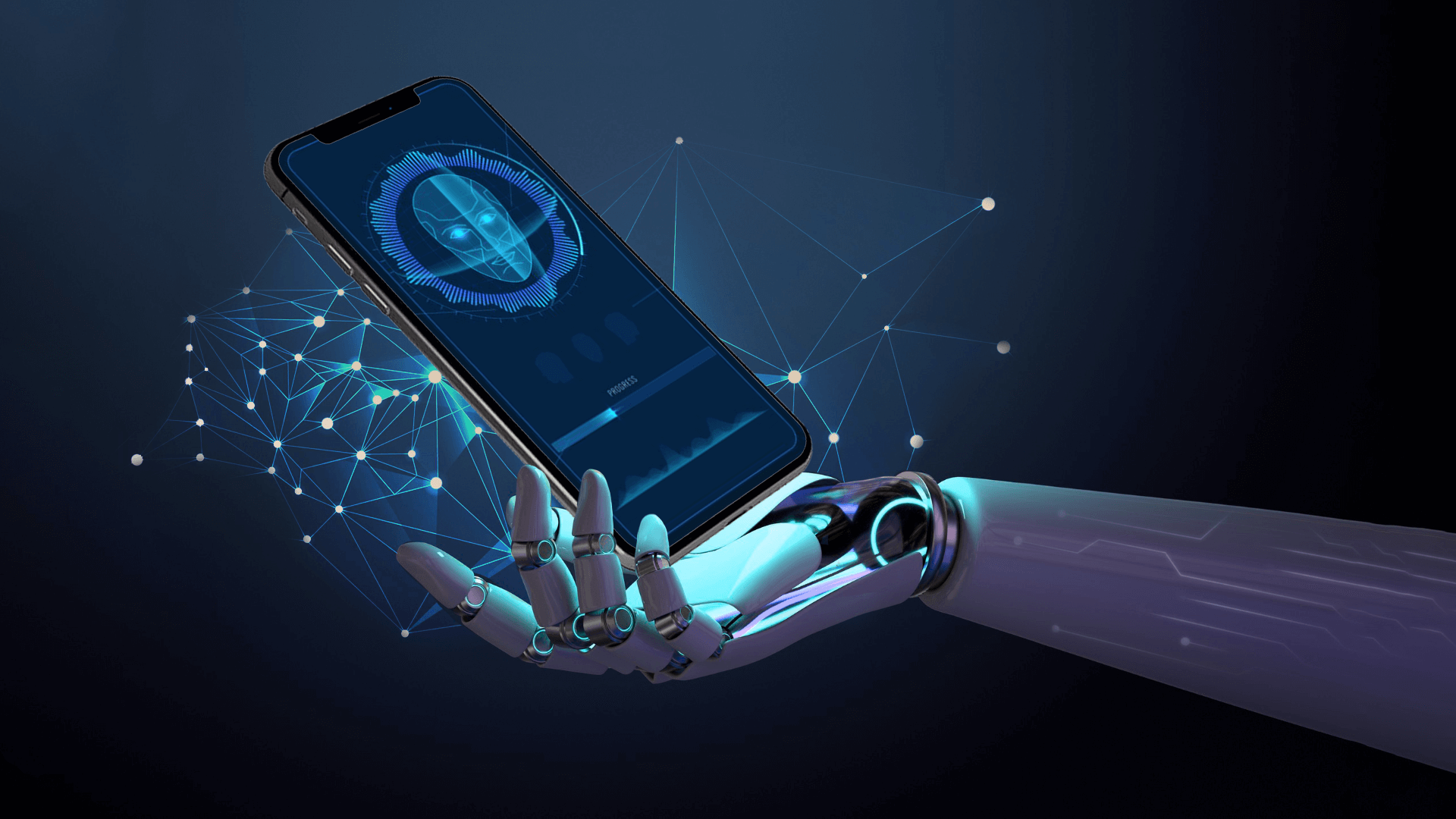
In the dynamic market of mobile app development, the implementation of Artificial Intelligence (AI) is nothing short of revolutionary. In light of the complexity that characterizes this technological age, it is crucial to understand how AI affects mobile applications in relation to the future.
Picture a mobile application that does not only comprehend user preferences but predicts them, providing an effortless and customized interface. This is the capability of AI in mobile app development. AI stands apart from traditional programming in that apps are empowered to learn and adapt, translating into increased user engagement and satisfaction.
Currently, the mobile app development world is witnessing a unique amalgam of AI features and creative apps in several industries. From virtual assistants offering real-time support to predictive algorithms smoothening user experiences, AI is everywhere. Logistics is also an area where AI has been making major breakthroughs, in terms of optimizing routes, predicting demands and thus increasing the overall efficiency.
The global mobile AI market in the year 2020 was valued at $8.56 billion. Jumping to the projected horizon of 2030, the figure will skyrocket to an eye-popping $84.80 billion. Such an exponential growth rate, with the CAGR estimated to be 26.44% in the period spanning from 2021 through to 2030 demonstrates a steadily increasing impact of AI on how mobile applications will define the future.
Now, what lies ahead? The future holds even more exciting innovations. From AR improving user experience to AI-led automation changing logistical processes, the landscape is immense. The incorporation of AI in logistics apps undoubtedly shows great prospects for businesses looking to optimize their supply chains through cost and efficiency reduction.
In the following sections, we will examine the use of AI in mobile app development highlighted above, which is changing the logistics world. We will also touch upon the challenges and opportunities that come along with this technological wave, offering vital insights to those interested in pursuing AI-automated logistics app creation. Therefore, buckle up and get ready for a ride into the future of AI in mobile app development where innovation is endless.
How is AI Used in Mobile App Development?
The integration of AI in mobile application development is more than just a trend- it is a transformative tool that defines the nature, capabilities and evolution of apps. Now, let’s dive into modern applications of AI in mobile app development with real-world cases that highlight the power of this technological union.
- Personalized User Experiences
AI helps mobile apps understand the preferences and behaviors of users, resulting in unique experiences for every user. For example, take a look at the recommendation algorithms in leisure apps such as Netflix or Spotify. Constantly learning from user interaction, apps recommend movies, shows or music based on the user’s interest for better engagement and satisfaction.
- Virtual Assistants and Chatbots
Virtual assistants and chatbots powered by AI have changed the concept of user interactions. Applications such as Siri, Google Assistant and Alexa use natural language processing algorithms to capture user queries. Within the sphere of logistics apps, chatbots allow bringing real-time information on shipments, reply to customers’ requests, and enable quick communication processes that result in better user experience.
- Predictive Analytics for Enhanced Functionality
AI-driven predictive analytics transforms mobile apps. For instance, in finance apps, AI algorithms study the spending patterns and predict the future costs; they also provide insight into more effective financial planning. In the field of logistics, predictive analytics helps to optimize routes; anticipate changes in demand fluctuations and increase the overall efficiency of supply chains.
- Image and Voice Recognition
Mobile apps use AI for sophisticated image and voice recognition. These functions include facial recognition within camera apps, voice commands on navigation apps, and even language translation such as idict.ai that applies AI to provide interpretation and response of visuals and sounds. This not only improves user experience but also creates opportunities for other unconventional functions.
- AR and VR
Powered by AI, AR and VR technologies are advancing in mobile app development. AR-based gaming applications such as Pokémon GO combine real and virtual aspects to provide an immersive experience. In logistics, AR can help in warehouse management with real-time information on inventory while VR should be used for immersive training experiences.
- Fraud Detection and Security
Security is critical in mobile app development. AI algorithms are particularly good at identifying anomalies and patterns that could signal fraud. For instance, banking applications apply AI to transaction patterns and recognize suspicious activities rapidly enough for immediate account security.
Integration of AI, on the other hand, fundamentally enhances user experiences by making apps intelligent, responsive and personalized. Today’s users demand personalized recommendations, faster solutions to problems, and user-friendly interfaces - all of which AI makes possible. This impact does not only apply to the user satisfaction, but also to functionality and operational effectiveness.
The following section analyzes some useful case studies, which demonstrate the triumph of AIs in mobile app development. These practical cases will show how AI is revolutionizing different industries and prepare for the century of intelligent mobile applications.
Case Studies: The Pivotal Role of AI in Mobile App Development
The transformational nature of AI in mobile app development is made clear when analyzing successful case studies across various sectors. These cases indicate not only the adaptability of AI applications but also emphasize the large positive impacts on user involvement, income, and other important indicators.
- Spotify: Personalized Music Recommendations

The popular music streaming application Spotify uses AI, to offer individualized playlists and recommendations for its users. Spotify’s AI algorithms perceive the listening patterns, preferred genres and even mood changes in order to adapt their suggestions accordingly. The level of personalization that we have achieved has gone a long way in increasing engagement, ensuring that users remain glued to the platform for extended periods. The result? Higher subscription rates and a significant increase in revenue.
- Starbucks: AI-Powered Customer Engagement

AI has been used by Starbucks, which is a leader in integrating technology and customer experience to observe its mobile application activities. The app uses AI that helps it learn customer preferences, suggest customized beverages and even simplify the ordering process. With unique personalized promotions and rewards from the behavior, Starbucks has made higher customer satisfaction and loyalty. Unlike previous systems, AI becomes an integral part of the process with no noticeable changes, as witnessed in user behavior which contributes to sales and offers a high level of brand loyalty.
- Snapchat: Augmented Reality (AR) Filters

Snapchat, an innovative social media network with aesthetic and useful filters, has found a way of implementing AI by means of using augmented reality as one of its typical functional features. These filters, which function based on AI algorithms, are capable of identifying face features and integrating interactive elements. Snapchat’s AR filters not only capture customers in terms of engagement but also draw partnerships and sponsorship. Brands utilize such filters to create innovative ads and thereby, offering a source of revenue for Snapchat every time a consumer applies one while further boosting the user’s enjoyment.
- Duolingo: Adaptive Language Learning
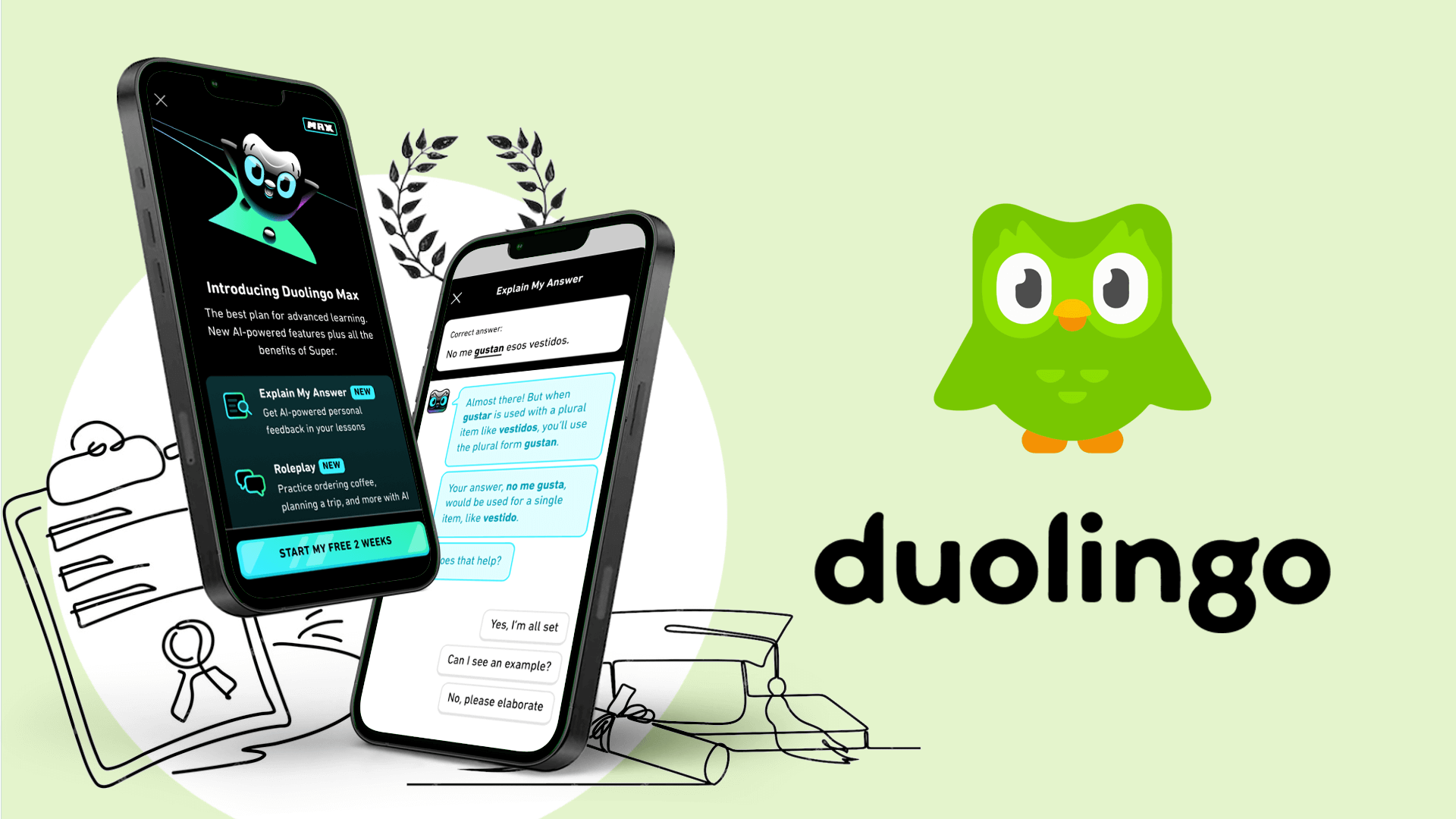
Many e-learning companies adopt AI in their products to provide personalized recommendations. For instance, Duolingo, which is a language learning app seeks to offer its users the learning path that best suits them. However, the app responds to individual progresses, strengths and weaknesses guaranteeing each user receives personalized practice in order to improve their language learning journey. The adaptive learning model fuelled by artificial intelligence has resulted in astonishing improvements in the level of user retention and proficiency. Users remain interested and effective in their learning, which helps to strengthen Duolingo’s position as a top language app.
- Uber: AI-Powered Predictive Analytics
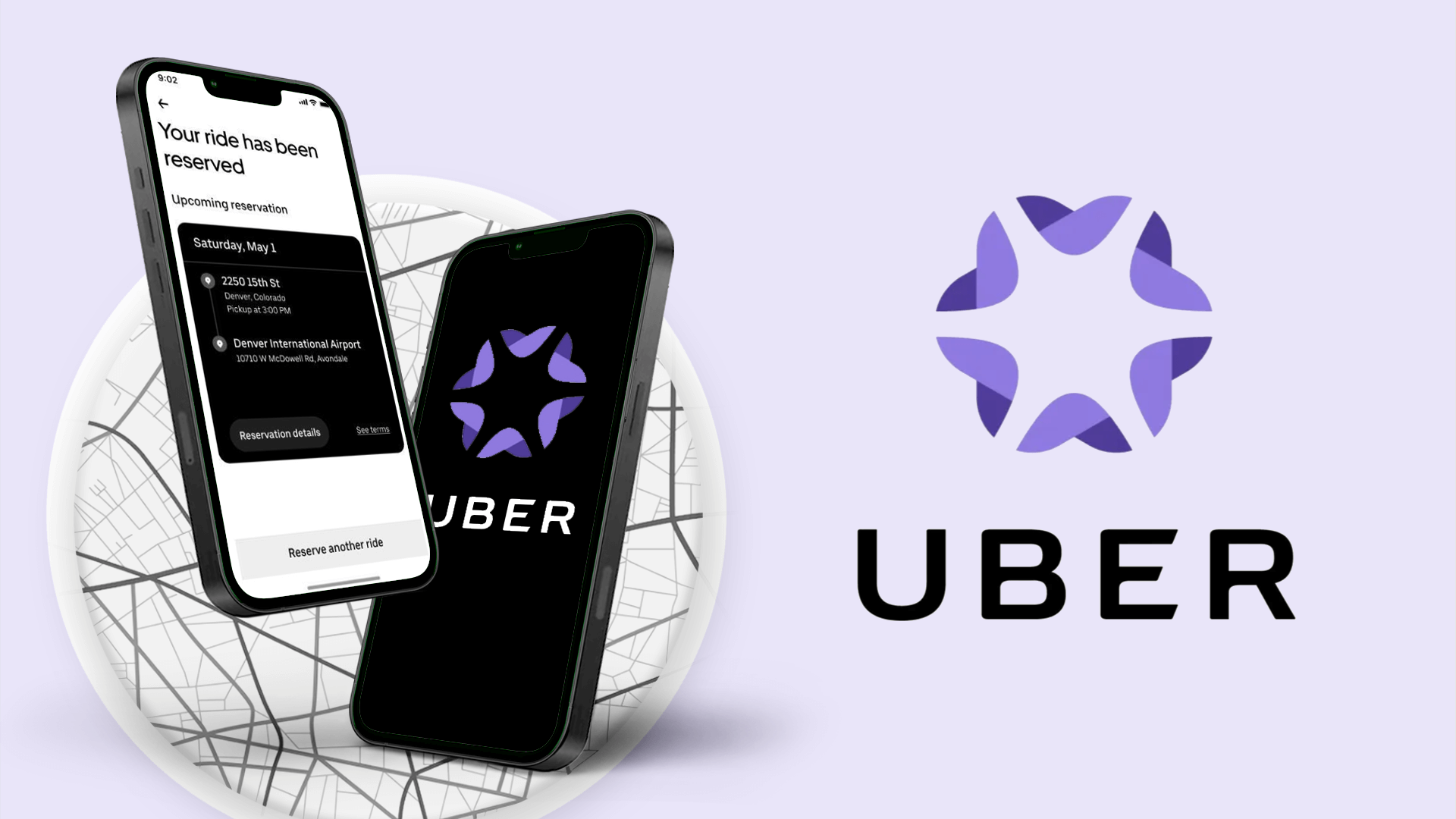
Uber, the ride-sharing giant, utilizes AI for predictive analytics to enhance user experience and operational efficiency. The app predicts demand patterns, allowing for strategic positioning of drivers and optimizing wait times for users. By harnessing AI for dynamic pricing based on demand, Uber has achieved increased revenue during peak hours. The accurate predictions not only contribute to customer satisfaction but also play a pivotal role in the overall efficiency of the platform.
Across these case studies, the integration of AI in mobile app development has led to tangible benefits. User engagement sees a significant boost as AI enables a more personalized and interactive experience. This, in turn, translates into increased user retention and loyalty.
| Case Study | AI Implementation Statistics and Cost Information |
|---|---|
| Spotify | User Engagement Increase - 25% longer average session duration. |
| Revenue Boost - 20% increase in premium subscription sign-ups. | |
| Implementation Cost - $10 million for AI development and integration. | |
| ROI - Achieved within 18 months post-implementation. | |
| Starbucks | Customer Engagement - 30% increase in app engagement. |
| Revenue Impact - 15% growth in mobile app-driven sales. | |
| Implementation Cost - $5 million for AI-powered features. | |
| ROI - Realized within 12 months with enhanced user loyalty. | |
| Snapchat | User Interaction - 40% rise in daily active users utilizing AR filters. |
| Advertising Revenue - $50 million generated through sponsored filters. | |
| Implementation Cost - $15 million for AI filter development. | |
| ROI - Achieved within 24 months with increased brand partnerships. | |
| Duolingo | User Retention - 25% reduction in dropout rates. |
| Learning Outcomes - 30% improvement in proficiency levels. | |
| Implementation Cost - $8 million for adaptive learning AI integration. | |
| ROI - Realized within 15 months with increased user satisfaction. | |
| Uber | Operational Efficiency - 20% reduction in average wait times |
| Revenue Growth - 15% increase during peak hours with dynamic pricing | |
| Implementation Cost - $20 million for predictive analytics development. | |
| ROI - Achieved within 24 months with improved driver and user satisfaction. |
The advantages that one is bound to get in terms of increased revenue are clearly visible. Either by private suggestions boosting subscription purchase (as is the case of Spotify), or through AI-aided advertising media (illustrated in Snapchat); AI proves to be an impactful money generator tool.
In addition, an AI deployment tends to lead to better efficiency in the operation and thereby contributes to cost cutting leading towards high level business success. The success stories of these mobile applications illustrate the revolutionizing capabilities of AI for businesses where it is high time to change the pattern or follow the changes by introducing breakthrough AI-driven solutions that remain effective overtime and satisfy users.
The Role of idict AI in Cross-Lingual Communication
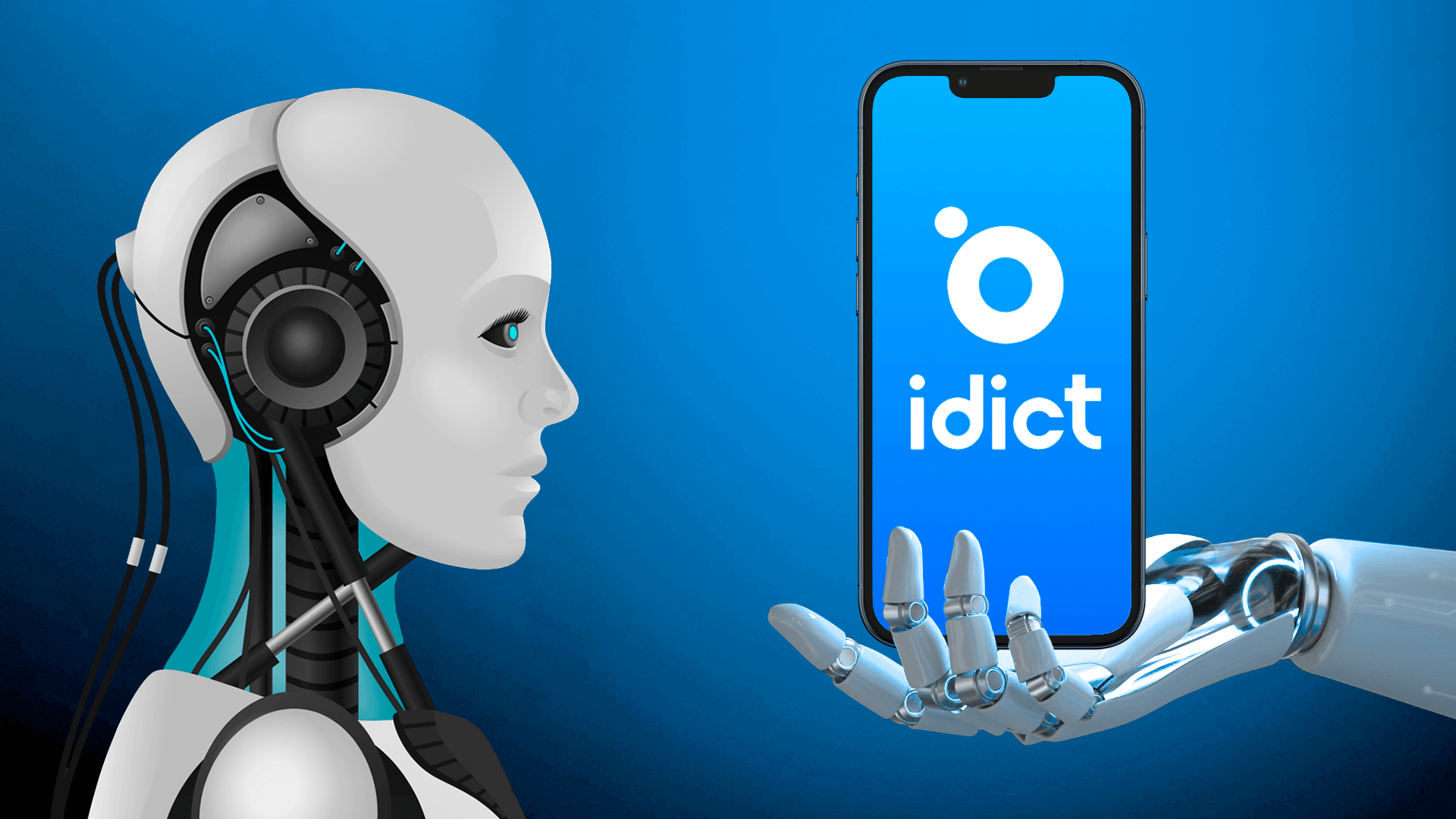
In the global villages where everything suddenly came within easy reach, communicating effectively across languages becomes crucial. Idict, a revolutionary platform that is redefining the translation industry and setting new benchmarks in cross-cultural communication.
Introducing idict AI
idict is not just an instrument of translation; it is a fully capable and user-friendly service which provides the users with a real time convenient and effective version. Having several advanced machine learning algorithms, idict.ai stands outside the boundaries of dictionary just as a translating tool but it lets users communicate with each other freely from one language to another by providing them a platform for talking in an easy and natural manner.
Revolutionizing Translation Experiences
idict’s hallmark lies within the quality of it offering precise, profoundly representative renditions on the fly. This not only puts away barriers of language but ensures that the translation is done in such a way that very minute details like the tint, emotional touch and cultural arrays are well kept. When making telephone contact with someone from another region in business communication, traveling with a translation guide or arriving at the destination through idict’s online services, it guarantees that the real essence of the message is passed on beyond language barriers.
Contributing to Global Connectivity
Idict plays a pivotal role in fostering global connectivity. As businesses and individuals operate in an increasingly interconnected world, the ability to communicate seamlessly across languages is a game-changer. Idict becomes the bridge that facilitates understanding, collaboration, and meaningful interactions, thereby contributing to a more connected and inclusive global community.
idict is a perfect example of an organization that contributes to the promotion of global connectivity. We live in a world of global connectivity, and businesses as well at the individual level are able to communicate using multiple languages so it is really an advantage maker. Thus, the Idict serves as a mediator that fosters comprehension, partnerships and meaningful relationships across borders with an ultimately result of establishing a tightly knit world community.
Unique Features and Advantages
Idict is unique not only because of its accuracy but also that feature we popularly refer to as the voice cloning ability in cross lingual communication. This unique advantage provides the users with having their words turned into a voice that sounds like them, thereby maintaining the integrity and heartfelt aspects of communication. With the voice cloning function, whether negotiating with clients in business or connecting families, this translates to an added level of familiarity despite linguistic barriers.
Being in the preeminent position during the innovative phase of language revolution, idict destinies to utilize AI’s power not only for providing accurate translations and but also utilized into creating an all immersive and authentic cross lingual communication experience. In this global world that limits itself to the very diversity, idict comes out in such an alternative as breaking down language boundaries, increasing understanding and ultimately people's relationships.
The Future of AI in Mobile Apps
At the edge of a new wave in technology, mobile app development grounded on principles of artificial intelligence (AI) seems to bring about a revolutionary change. The accelerating development of artificial intelligence technologies will transform the future world of human-mobile device interactions, making it entirely brains, directed, yet personal.
Upcoming Trends in AI for Mobile Apps
- AI-Driven Personalization Reaches New Heights
The personalization of the future will be a paradigm shift in the field of AI algorithms fitted both more than prior commercial needs, wishes or consent. Mobile apps will involve making predictions about user action, in real-time adaptation of the interfaces according to a specific user, which feels as if it is designed for an individual. Tailor-made content recommendations for ReSharper are just the tip of an iceberg - every aspect of the user interface now becomes personal.
- Voice-Activated Interfaces Become Ubiquitous
Voice-driven , powered by artificial intelligence (AI driven natural language processing), interfaces will soon become commonplace in mobile apps. Efficiency, accessibility and effectiveness are some of the benefits that will come with this functionality since users’ experience of interaction with these apps via voice commands will not only simplify how they interact but also redefine engagement. The implementation of voice technology will be more than the virtual assistants, but it will manifest inside other functionalities even on several applications where all are hand brushing and no other way.
- AI for Enhanced Augmented Reality (AR) Experiences
Through the efforts of Artificial Intelligence, AR apps will get a significant boost in realism. Since the AI algorithms are better or even close to understanding the user’s environment and behavior, AR experiences will be experienced as more holistic context-orientation. Through applying AI and AR to world immersive gaming, as well as related applications such as the general preliminary view on furniture placement before purchase, this symbiosis of technologies will allow users to penetrate new levels of engagement.
- AI-Infused Cybersecurity Measures
As mobile apps become major sources for sensitive transactions and data storage, artificial intelligence will be the frontline in strengthening cybersecurity strategy. A suitable and real-time threat detection, anomaly identification, as well as adaptive protection systems will be employed through the usage of complex AI algorithms. The battles and wars of quality of cyber threats, AI guardians will win this race over non user data protection.
Potential Technological Advancements and Their Implications
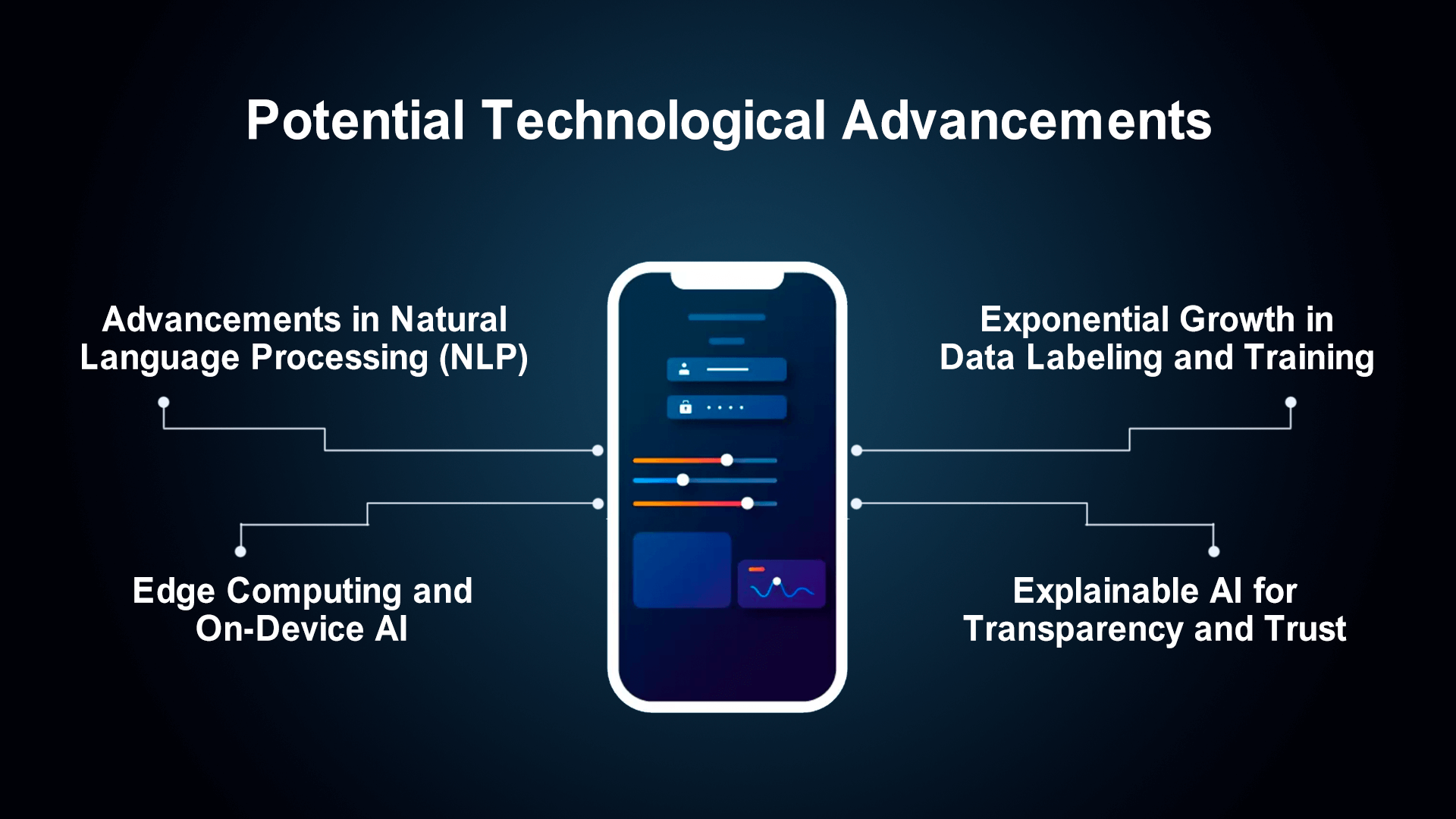
- Advancements in Natural Language Processing (NLP)
More advances benefitting NLP will help mobile apps to interpret and reply weekly human-like fluency. This not only increases the abilities of virtual assistants but also helps to be able to have a more natural conversation, between users and in different app functionalities. The implications include enhanced customer support, acceleration of communication and as an overall effect lesser friction between app users and clients.
- Edge Computing and On-Device AI
With the trends of edge computing, where AI processes do not apply only on cloud services but also occur directly within the device itself, this would surely reveal far-reaching effects. AI based protocol with such approach provides privacy, lowering latency and allowing us to have artificial intelligence functionality in offline mode. Self-sufficient apps and machine learning features of mobile applications will get even stronger without the need to be always connected to somewhere.
- Exponential Growth in Data Labeling and Training
Labeled data is all that an AI model needs, but the quality and quantity of such data should be a source of concern. Therefore, there is an emergence of the exponent revealed in our efforts towards data labeling that will improve AI models to a rare net accuracy. This will, in turn, create more dependable prediction models and tailored user experiences during the mobile functions.
- Explainable AI for Transparency and Trust
As AI will be deeply rooted in mobile Apps, this will require that there should be transparency and even accountability. The explainable AI of the future will be equipped with a capability that would help developers, as well as users comprehend how a system has reached its conclusions. This promotes trust; however, ethical and responsible use of AI in mobile application manufacturing is also ensured.
The Role of AI in Shaping the Future Mobile App Development Landscape
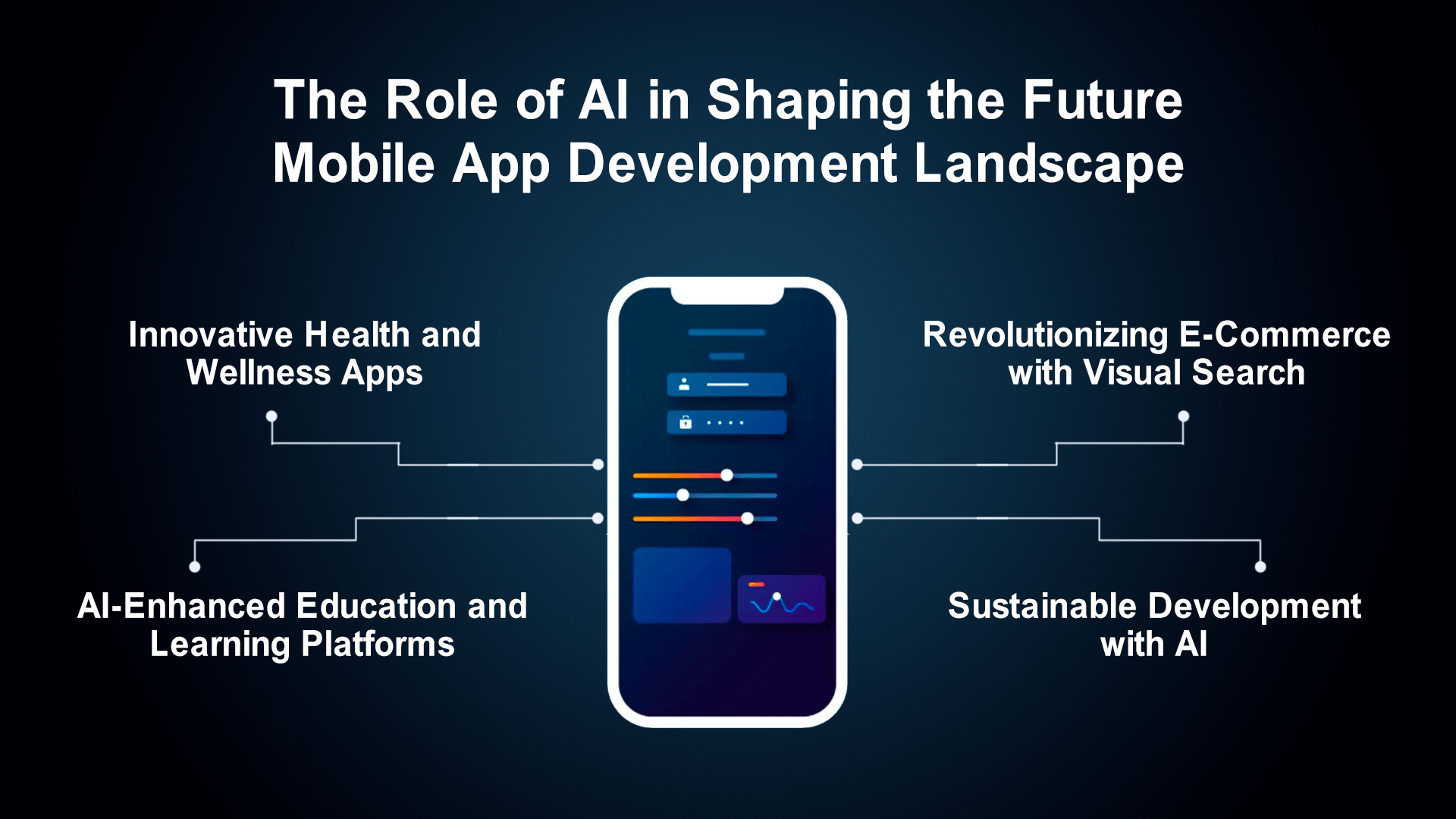
- Innovative Health and Wellness Apps
AI’s ability to improve health and wellness apps is going to further develop with predictive analytics, customized fitness plans regarding time, effort, price while still staying in optimum condition, even on mental levels. While mobile apps will definitely provide users with appropriate information, they are also likely to increase their well-being by adjusting the given data and patterns according to health needs.
- AI-Enhanced Education and Learning Platforms
The adverse part of education applications is the adaptive learning driven by Artificial intelligence which will rule the future of academic tools. These apps will test student's learning styles, customize the content to be delivered and offer personalized feedback. Artificial intelligence tutors will evolve and become a norm, helping students understand various intricate abstractions of the mind and help in customizing learning.
- Revolutionizing E-Commerce with Visual Search
This has made consumers explore AI-enabled capabilities by conducting visual search using their mobile apps. Users just need to use their camera for taking a picture of items of interest in line or anywhere near, and artificial intelligence algorithms will find matching products as well as location. Such a visual search feature will adjust the look of e- commerce by making product exploration easier.
- Sustainable Development with AI
Optimization through AI will also readily spread to sustainability practices. AI algorithms will be entwined to mobile apps with the benefits of energy conservation, reducing carbon footprints and being a part of ecological activities as well. As we see, artificial intelligence will be included in almost everything related to mobile applications specifically related with environmental responsibility from energy-efficient navigation till the promotion of sustainable products.
The direction of development of AI mobile apps is oriented to dynamism, adaptability and scanning app users’ needs. With mobile phones, the AI will not just make them smarter but entirely recreate how these irreplaceable digital life codes work. The roadmap lies ahead of us and it is very appealing – the future where mobile apps have turned from being just tools to intuitive companions, naturally interacting with our ongoing activities.
Challenges and Ethical Considerations in the Use of AI in Mobile Apps
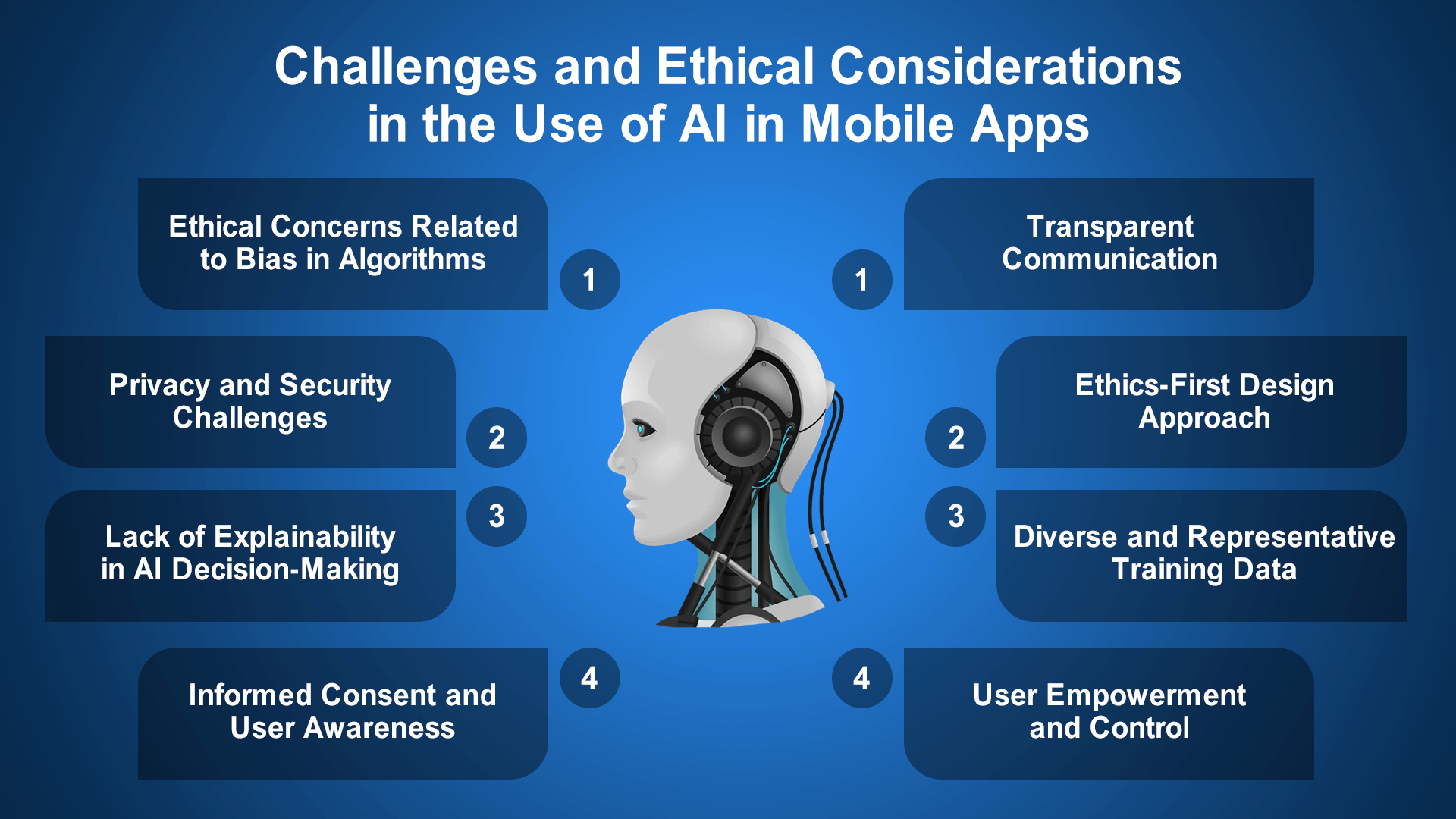
With the development of AI, there will be numerous ethical considerations and challenges that will be emerging with its involvement in mobile applications. AI’s responsible implementation in mobile application development includes balancing privacy concerns, algorithm biases and much more to ensure that progress is aligned with ethical terms.
- Ethical Concerns Related to Bias in Algorithms
One of the greatest ethical issues concerns the biases inherent within AI algorithms. Artificial intelligence-based mobile apps aimed to assist with the decision-making process, be it hiring, financial transactions or even content recommendations might unintentionally reinforce existing biases present in training data. This may result in discriminatory outcomes that further solidify the societal differences. Overcoming this issue involves precise consideration of the adequacy and representativeness of training datasets, as well as continuous efforts to identify and eliminate biased patterns in AI models.
- Privacy and Security Challenges
As AI algorithms gather huge amounts of user’s personal information to provide customized experiences, privacy becomes a major topic. Mobile apps can cause privacy violations by collecting too much or sensitive user information and this can lead to breaches in the system. However, security threats occur when the stored or transmitted data is exposed to unauthorized persons or malpractices. This involves the delicate balance between using user data for AI powered insight, but also protecting their privacy through strong encryption, data anonymization and transparent privacy policies.
- Lack of Explainability in AI Decision-Making
Indeed, the black box nature of AI decision-making raises ethical issues that are particularly acute when these decisions directly affect people’s lives. Mobile apps that use AI often do not have transparency in explaining how certain decisions or recommendations are arrived at. The law gives the user a right to know why decisions that relate to them in loan approvals, job applications and so on are made. However, it is critical for developers to focus on the creation of explainable AI models that help users understand how algorithms make particular decisions.
- Informed Consent and User Awareness
Users’ informed consent to the use of AI in mobile apps is also an ethical issue that should be taken into consideration. Frequently, users do not realize how many of the experiences they have in an app are influenced by AI algorithms. AI developers implement transparent communication strategies on how they apply AI, what data they collect and how it helps to improve the app’s abilities. Teaching users about the consequences of AI makes sure that they are aware of their decisions regarding involvement with the app.
Navigating Ethical Challenges Responsibly
- Transparent Communication
Communication between the developers and users must be open and transparent. Developers must define how AI is used within the app, what data it processes and the benefits to the end-user. This transparency fosters trust and empowers users to make educated choices regarding their participation.
- Ethics-First Design Approach
A design approach that prioritizes ethics entails integrating ethical considerations into all stages of the app’s development. Developers need to account for potential biases, value user privacy, and implement features of explainability in AI decision-making.
- Diverse and Representative Training Data
To mitigate biases in AI algorithms, it is crucial to use diverse and representative training data. Diverse and representative training data allows us to reduce biases in AI algorithms. Developers should proactively strive to incorporate data from different demographics in order to promote equality. Through periodic model audits, any developing biases can be spotted and corrected.
- User Empowerment and Control
User control over data is one of the key ethical principles. Mobile apps should possess strong privacy options, allowing users to control the amount of data they allow AI algorithms to use. Consent mechanisms should be straightforward, brief and readily obtainable.
Responsible integration of AI into mobile apps requires a particular dedication to moral considerations that centers on user well-being, privacy, and fairness. To overcome these ethical challenges, the industry can tackle biases in AI models and increase transparency to empower users to regain control of their data.
Conclusion
In the dynamic world of mobile apps development, the road towards the future is filled with AI promises to change our digital reality. The possibilities of AI in mobile applications are limitless ranging from personalized interactions and smooth translation to advanced learning platforms. Learn also about the role of Ai in healthcare app development.
Looking to the future technological developments, it becomes evident that the coming together of AI and mobile app development is not just a fad - it’s a revolutionary power creating our modern digital reality. They are also potential areas of innovation, responsibility, and building ethical and responsible apps.
Are you daydreaming about developing an artificially intelligent app on your mobile device? Addevice is willing to bring your ideas into life. Our team of professionals seeks to design AI-powered mobile applications that are pioneering, user-friendly, ethical and exploit the essence of Artificial Intelligence to its full capacity.
Why Addevice? Our track record says it all. We have a rich history of creating innovative mobile apps using modern AI technologies to provide unique solutions that stand out from the competition. Be it improving user experience, streamlining operations or revolutionizing an idea entirely, we have the knowledge and skillset to turn your ideas into a reality.
Your journey into the future of AI through mobile app development starts with us at Addevice. How about working together to develop an app that not only meets but even surpasses the expectations of those who use your platform. Grab the opportunities and let Addevice become your companion in building the gen next of intelligent mobile encounters. Your vision together with our knowledge will change what is possible.
Unlock the Power of AI in Mobile App Development
Discover the boundless possibilities of integrating AI into mobile app development for unparalleled innovation and user experiences. With cutting-edge AI technologies at our disposal, we're paving the way for next-generation mobile solutions.
Explore our offerings:
✨ AI-powered app development
✨ Enhanced user engagement
✨ Intelligent automation
✨ Personalized experiences
FAQ
AI improves user experiences through personalized interactions, predictive analytics, and smooth integrations. Right from individualized suggestions to adaptable interfaces, AI makes portable applications more instinctive and captivating.
AI poses challenges in privacy and security due to the fact that it is capable of handling large volumes of user data. Finding a middle ground between using data for AI insights and protecting privacy is crucial, yet it necessitates high-level encryption, data anonymization, and clear privacy policies.
Trends for the future include artificial intelligence-led personalization reaching unprecedented levels, the prevalence of voice activated interfaces, growth in augmented reality experiences and AI enhanced cybersecurity solutions.
Bias elimination includes the usage of diverse and representative training data, ethics-first design techniques, and AI decision-related transparency. Constant auditing of AI models allows detecting and eliminating developing biases.
Addevice is a mobile app development pioneer that utilizes AI to create unique and people-focused solutions. Committed to ethical conduct, Addevice is ready to work with you and help make your idea of AI-based app a reality. Connect with us to begin your transformative journey into the mobile app future.
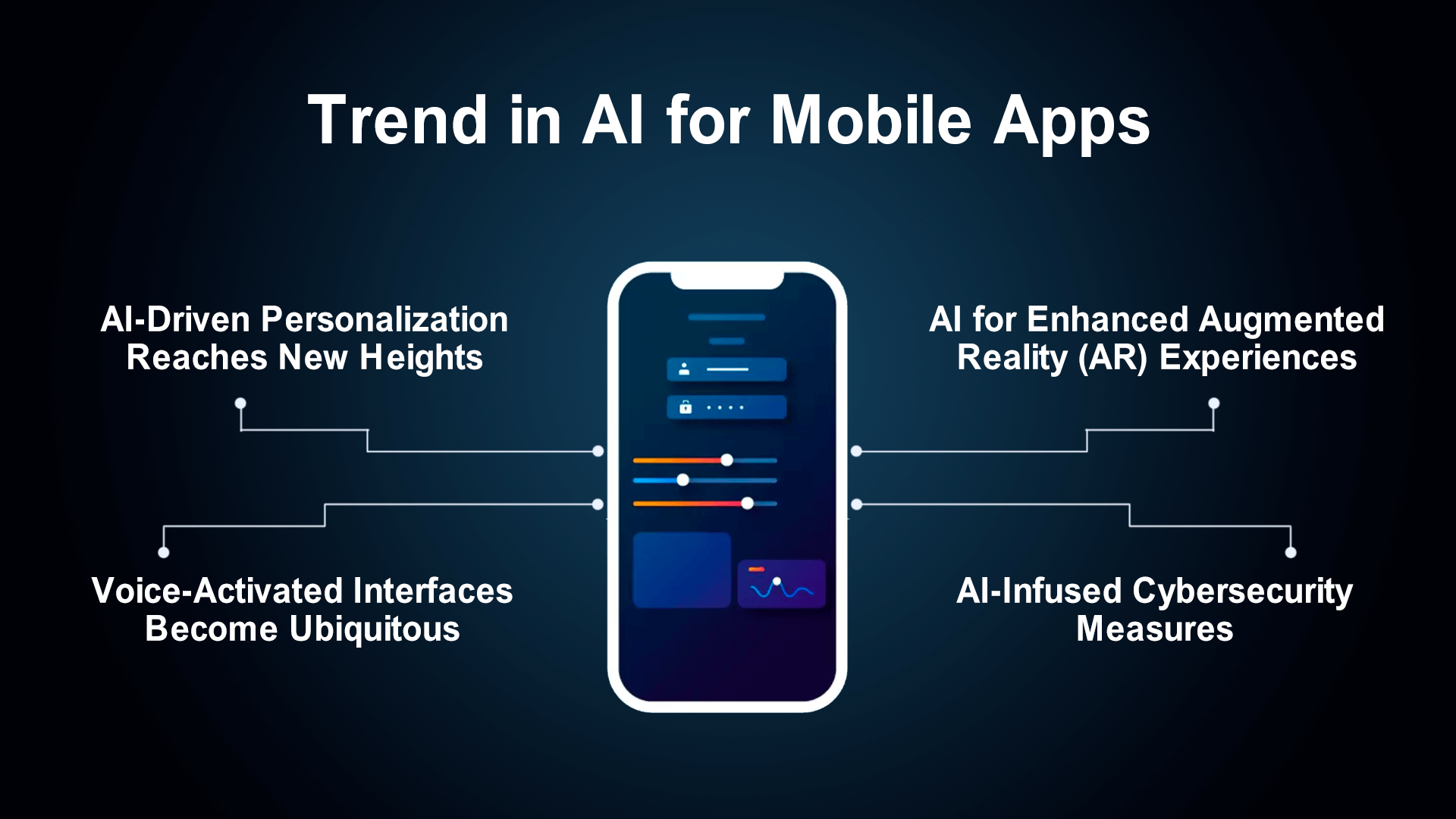
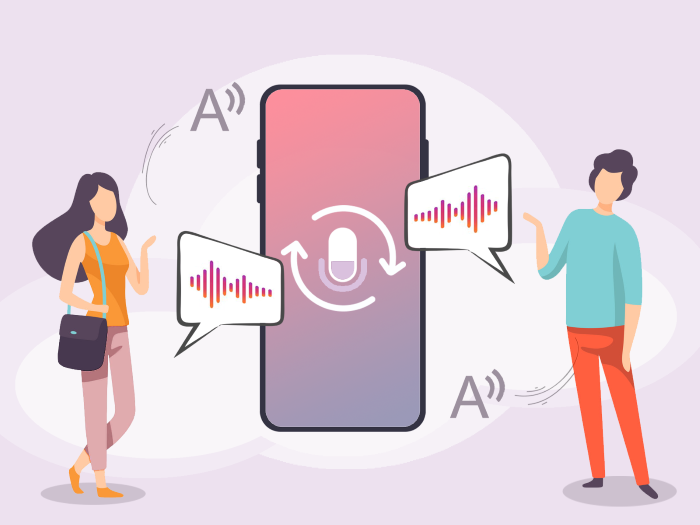 How to Create a voice translation app: Features & Cost
How to Create a voice translation app: Features & Cost
 How To Start A Streaming Service: Guide For App Ideas
How To Start A Streaming Service: Guide For App Ideas
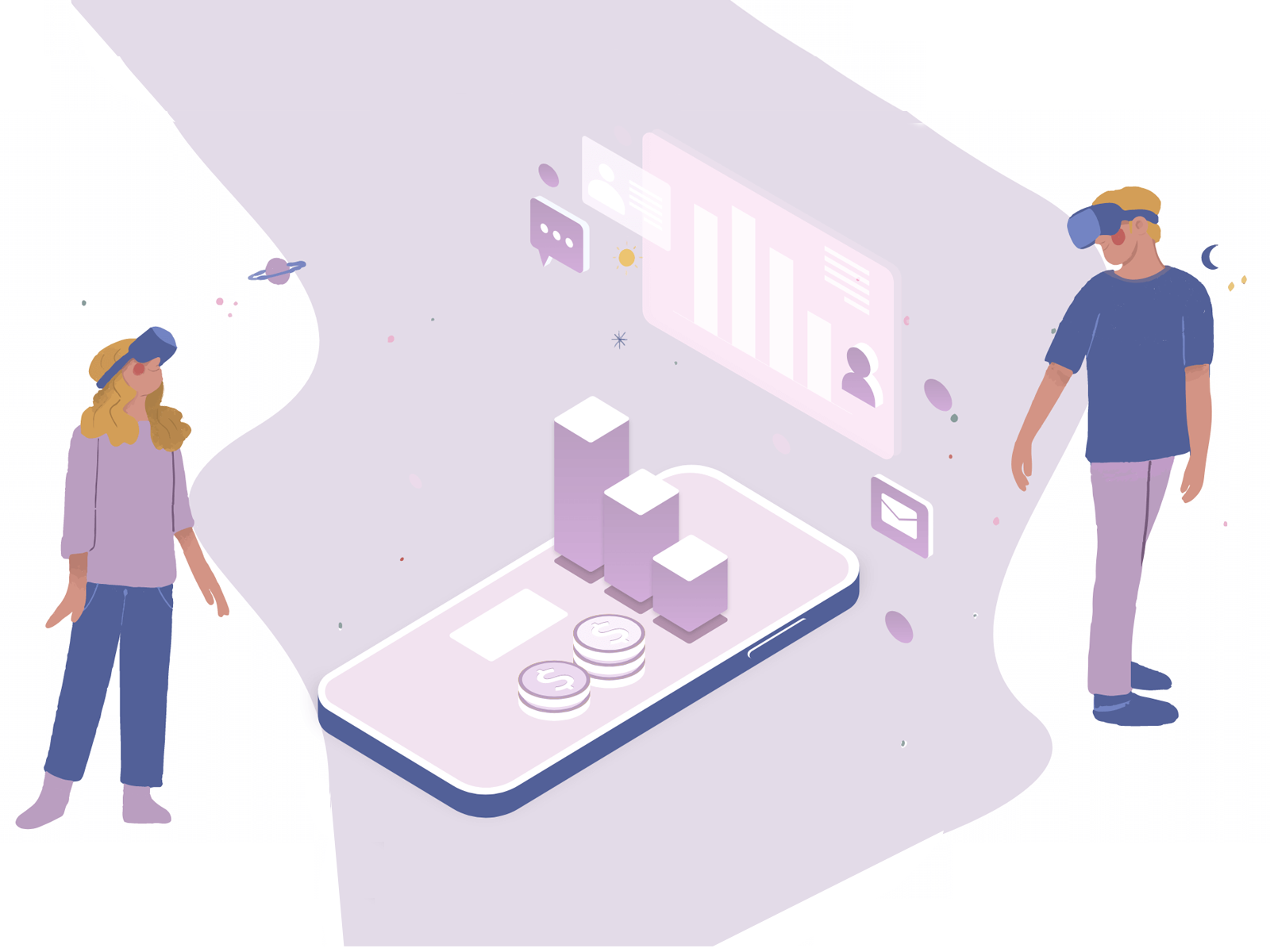 Augmented Reality App Development: Extensive Guide
Augmented Reality App Development: Extensive Guide